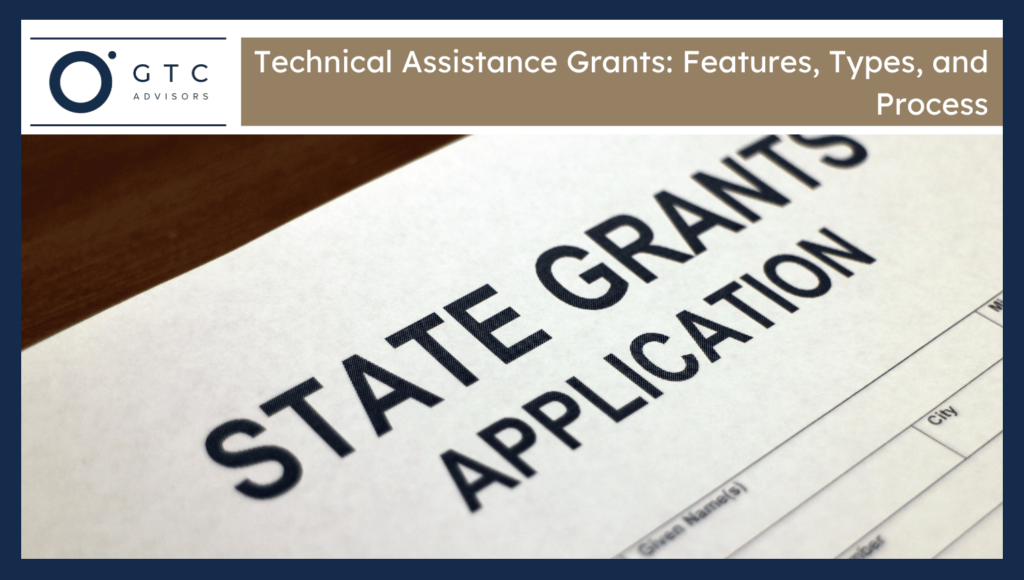Technical Assistance (TA) Grants provide technical support to organisations to enhance their operations, management and program delivery. The grants provide assistance in terms of professional advice, consulting, training or strategic planning. TA grants are particularly useful in nonprofits, small agencies, or developing programs in need of assistance in creating internal capacity. They apply their attention in fields such as assessment, finances, management, and service enhancement. The technical assistance grants define the change in organisations by making the operations more effective and sustainable to achieve long-term goals with more certainty and clarity.
What are the Key Features of Technical Assistance Grants?
Here are four key features of technical assistance grants:
- Non-Programmatic Focus ensures that the grant is helping an organisation to better itself, not to directly provide a service or to scale a program.
- Expert-Driven Support is an engagement where consultants, trainers, or experts provide specific advice, training, or planning assistance.
- Time-bound Activities refer to particular services or tasks that are performed within a given deadline with defined short-term objectives.
- Capacity-Oriented Outcomes seek to build internal systems, staff skills and long-term sustainability instead of short-term public effects.
What are the Common Types of Technical Assistance Grants?
Here are the six types of technical assistance grants:
Strategic Planning Support
Strategic planning grants assist organisations to achieve long-term organisational objectives and direction. Experts can help in setting priorities, missions matching and schedules. This guarantees better decision-making and utilisation of resources.
Technology and Systems Upgrades
These grants include new software, databases or hardware. They have the target to enhance efficiency, manage data, and offer services. Support most often includes installation, training and ongoing technical support.
Board Development and Governance
These funds are utilised in enhancing leadership in terms of training, recruitment, and practices of governance. An effective board enhances transparency and control of an organisation. Grants can involve access to consultations or workshops.
Fundraising and Financial Planning
Funding of this category is provided in donor engagement strategies and financial predictions. Nonprofits can enhance funding, budget management and sustainability strategies. The kind of support and assistance enhances financial well-being in the long run.
Compliance and Risk Management
These grants address legal, financial and operational protections. They assist organisations in remaining regulatory-compliant and minimising risk. These are common businesses like HR policies, insurance and audit systems.
Evaluation and Impact Measurement
Monitoring and assessment of program outcomes are supported. Evaluation tools, data systems, or consultants are examples of areas largely financed by grants. This assists nonprofits in demonstrating impact and directing improvement in their programs.
What Is the Application Process for Technical Assistance Grants?
The process includes seven structured steps from announcement to project launch:
- Grant Announcement: Technical assistance grants are announced publicly by funding agencies. These advertisements contain eligibility, priorities, deadlines, and submission directions.
- Proposal Preparation: The organisations prepare a formulated proposal document detailing needs, objectives, and assistance required. This contains a project plan, the result to be expected and the requirements of resources.
- Application Submission: Application forms that have been filled out are sent online via portals or mailed to the email address as instructed. All forms, attachments, and certifications are to be provided. Incomplete or late applications are not usually considered.
- Evaluation and Review: Applications are reviewed by panels that take into account their fit with priorities, viability, and capacity. The scoring of each of the proposals is based on prescribed criteria. Reviewers can ask questions or make changes.
- Award Decision: After reviewing candidates, an approval notification is sent to those who are approved. In some agencies, there are conditional approvals awaiting final documentation. Feedback can be offered to unsuccessful applicants.
- Agreement Finalisation: Approved grantees agree to a formal agreement that outlines the scope, timeline, budget and reporting requirements. Contractual and budget terms are also checked. This agreement is between both parties.
- Project Kick-Off: After the signing of the agreement, the funded project officially starts. Grantees can also be provided with an orientation or onboarding service.
How Are Technical Assistance Grants Monitored?
Below are the six steps to monitor a technical grant:
- The Initial Needs Assessment determines the weaknesses of the organisation, its goals, and the kind of support it needs before the start of the grant activities.
- Progress Check-ins are regular reports between the funder and grantee on achievements, schedule and other progress issues.
- Consultant Deliverables Review verifies the quality and completion of work by experts or consultants on the grant.
- Financial Oversight keeps a record of expenditures of funds to make sure that it is utilised in line with approved budgetary and grant provisions.
- Beneficiary Feedback collects the comments of staff or participants who were assisted to evaluate the usefulness and satisfaction.
- Final Report Submission is provided with a summary of all activities, results obtained, difficulties experienced and proposals to make the future better.
Who Can Apply for Technical Assistance Grants?
Here are the two main groups that can apply:
- Eligible Applicants are nonprofits, community-based organisations, educational institutions, and small agencies.
- Priority Recipients are usually organisations that work with underserved populations and new or developing nonprofits in need of structural improvement.

George C. Tagg, Jr.
George serves as a trusted counsel to business leaders, non-profit executives, and management teams. George is a licensed attorney with a master’s in international affairs and over 20 years’ experience in the U.S. Congress, Department of State, Department of Defense, global public policy, and political campaigns.


